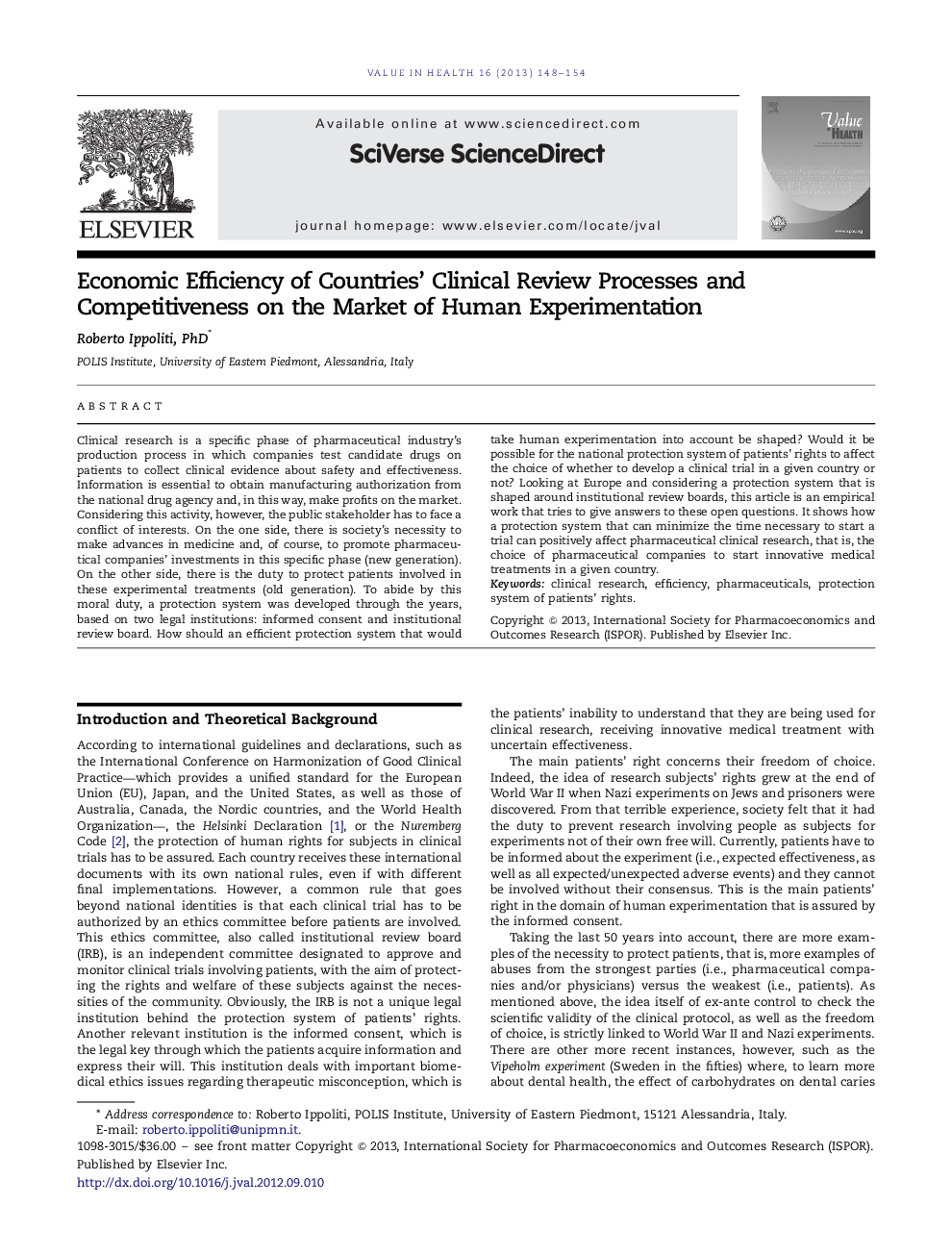| کد مقاله | کد نشریه | سال انتشار | مقاله انگلیسی | نسخه تمام متن |
|---|---|---|---|---|
| 10485045 | 935431 | 2013 | 7 صفحه PDF | دانلود رایگان |
عنوان انگلیسی مقاله ISI
Economic Efficiency of Countries' Clinical Review Processes and Competitiveness on the Market of Human Experimentation
ترجمه فارسی عنوان
کارآیی اقتصادی فرایندهای بازبینی بالینی و رقابتپذیری بازار در بازار آزمایشهای انسانی
دانلود مقاله + سفارش ترجمه
دانلود مقاله ISI انگلیسی
رایگان برای ایرانیان
کلمات کلیدی
تحقیقات بالینی، بهره وری، داروها، سیستم حفاظت از حقوق بیمار،
ترجمه چکیده
تحقیقات بالینی، یک مرحله خاص از فرآیند تولید صنعت داروسازی است که در آن شرکت ها داروهای نامزدی را در بیماران برای جمع آوری شواهد بالینی در مورد ایمنی و اثربخشی آزمایش می کنند. اطلاعات برای کسب مجوز تولید از اداره ملی مواد مخدر ضروری است و به این ترتیب سود را در بازار به دست می آورید. با این وجود، با توجه به این فعالیت، ذینفعان عمومی باید با تضاد منافع مواجه شوند. از سوی دیگر، ضرورت جامعه برای پیشرفت در پزشکی وجود دارد و، البته، برای ارتقاء سرمایه گذاری شرکت های دارویی در این فاز خاص (نسل جدید) وجود دارد. از طرف دیگر، وظیفه حفاظت از بیماران درگیر در این درمان های تجربی (نسل های قدیمی) است. برای پیروی از این وظیفه اخلاقی، یک سیستم حفاظت در طول سال ها بر اساس دو نهاد قانونی: رضایت آگاهانه و هیئت نظارت نهادی ایجاد شد. چگونه باید یک سیستم حفاظت کارآمد که به حساب انسانی در نظر گرفته شود شکل بگیرد؟ آیا امکان دارد که سیستم حفاظت ملی حقوق بیمار بر انتخاب اینکه آیا یک آزمایش بالینی در یک کشور مشخص وجود دارد یا نه، تاثیرگذار باشد؟ با نگاهی به اروپا و با توجه به یک سیستم حفاظتی که در اطراف هیئت مدیره بررسی وجود دارد، این مقاله کار تجربی است که تلاش می کند تا پاسخ های این پرسش های باز را پاسخ دهد. این نشان می دهد که چگونه یک سیستم حفاظت که می تواند زمان لازم برای شروع یک محاکمه را به حداقل برساند، می تواند تاثیر مثبتی بر تحقیقات بالینی دارویی، یعنی انتخاب شرکت های دارویی برای شروع درمان های نوین پزشکی در یک کشور مشخص داشته باشد.
موضوعات مرتبط
علوم پزشکی و سلامت
پزشکی و دندانپزشکی
پزشکی و دندانپزشکی (عمومی)
چکیده انگلیسی
Clinical research is a specific phase of pharmaceutical industry's production process in which companies test candidate drugs on patients to collect clinical evidence about safety and effectiveness. Information is essential to obtain manufacturing authorization from the national drug agency and, in this way, make profits on the market. Considering this activity, however, the public stakeholder has to face a conflict of interests. On the one side, there is society's necessity to make advances in medicine and, of course, to promote pharmaceutical companies' investments in this specific phase (new generation). On the other side, there is the duty to protect patients involved in these experimental treatments (old generation). To abide by this moral duty, a protection system was developed through the years, based on two legal institutions: informed consent and institutional review board. How should an efficient protection system that would take human experimentation into account be shaped? Would it be possible for the national protection system of patients' rights to affect the choice of whether to develop a clinical trial in a given country or not? Looking at Europe and considering a protection system that is shaped around institutional review boards, this article is an empirical work that tries to give answers to these open questions. It shows how a protection system that can minimize the time necessary to start a trial can positively affect pharmaceutical clinical research, that is, the choice of pharmaceutical companies to start innovative medical treatments in a given country.
ناشر
Database: Elsevier - ScienceDirect (ساینس دایرکت)
Journal: Value in Health - Volume 16, Issue 1, JanuaryâFebruary 2013, Pages 148-154
Journal: Value in Health - Volume 16, Issue 1, JanuaryâFebruary 2013, Pages 148-154
نویسندگان
Roberto PhD,
